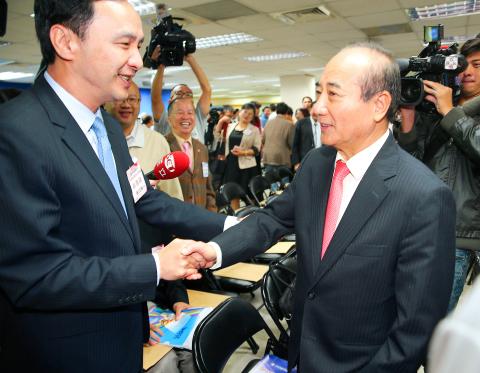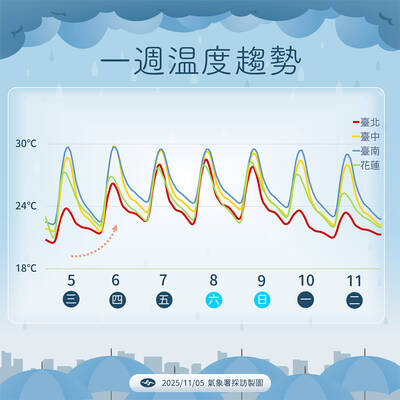The Chinese Nationalist Party’s (KMT) third convention of the Central Committee formally confirmed all 34 nominees for legislator-at-large positions yesterday.
The top 12 members on the list are considered to be “safe” — meaning they are virtually assured of getting legislative seats — and include five holding expertise or knowledge in other fields: academic Ko Chih-en (柯志恩), doctor Chen Yi-min (陳宜民), Lin Li-chan (林麗蟬), whose wife is an immigrant from Cambodia, TEDxTaipei cofounder Jason Hsu (許毓仁) and Financial Supervisory Commission Chairman William Tseng (曾銘宗).
The other candidates who secured “safe seats” are all political veterans: Legislative Speaker Wang Jin-pyng (王金平), Legislator Huang Chao-shun (黃昭順), former Taoyuan County commissioner John Wu (吳志揚), former legislator Chang Li-shan (張麗善), Hualien County Commissioner Fu Kun-chi’s (傅崑萁) wife, Hsu Chen-wei (徐榛蔚), Presidential Office Secretary-General Tseng Yung-chuan (曾永權) and Legislator Alicia Wang (王育敏).

Photo: CNA
KMT Chairman Eric Chu (朱立倫) said legislator-at-large candidates are considered for conforming to social expectations and political realities, and half are nominated for their professional skills and knowledge.
“We wish to put more professionals in the Legislative Yuan, and while the KMT has the talent needed for political negotiation, representation of different areas must also be considered,” Chu said.
“The KMT has faced great difficulties and it has persevered by facing challenges head-on,” Chu said.
He said the list of nominees would likely face some criticism, but that the party cannot stop the reform process, adding that the KMT must always look forward, not back.
Chu said that while the party welcomes any criticism and apologizes to those who did not make the nomination list, members should trust the party and believe it has done its best to balance the needs of each district.
He said the party would make certain the legislators-at-large know the responsibilities that come with their title in order to avoid a situation similar to that of Huang, who in September withdrew from the legislative election in her Kaohsiung constituency for “purely personal reasons.”
Huang had said at the time that after a “painful mental struggle” she decided to withdraw, adding that her decision had nothing to do with “fear of combat” and that she was not “jumping ship.” Huang was replaced in the Kaohsiung race by former Mainland Affairs Council (MAC) deputy director Chang Hsien-yao (張顯耀), who last year was accused by then-MAC minister Wang Yu-chi (王郁琦) of leaking confidential information to China, but in the end was not indicted by prosecutors.
KMT Secretary-General Lee Shu-chuan (李四川) said after yesterday’s convention that, according to party regulations, rejecting a nomination requires half of all attending votes to be against a nominee, and that Jason Hsu, who some consider too “green,” received 66 against and 62 in support of his candidacy.
A total of 158 committee members cast their votes yesterday, meaning Jason Hsu would need 79 votes against him to have his nomination revoked. Jason Hsu had the most nay votes, followed by 60 for Hsu Chiao-hsin (徐巧芯), Chu’s campaign office spokesperson, who is 17th on the list, and KMT Yilan chapter director Lin Hsin-hua (林信華) with 55 votes.
“The regulations are in place for good reason, and personal wishes for nominated candidates to make it into the ‘safe seats’ makes the job of the secretary-general unenviable,” Lee said, adding that the party would be in trouble if members do not put aside their personal wishes.
Chu said that while many people considered it impossible to win the Jan. 16 elections, the party must be strong and determined because it is not running for their generation, but for the next generation.
“Taiwan should offer its children the chance of ‘standing on the shoulders of giants’ when competing against others,” Chu said, adding that his generation’s duty is to be giants, so that Taiwanese children will be able to see more.

Three Taiwanese airlines have prohibited passengers from packing Bluetooth earbuds and their charger cases in checked luggage. EVA Air and Uni Air said that Bluetooth earbuds and charger cases are categorized as portable electronic devices, which should be switched off if they are placed in checked luggage based on international aviation safety regulations. They must not be in standby or sleep mode. However, as charging would continue when earbuds are placed in the charger cases, which would contravene international aviation regulations, their cases must be carried as hand luggage, they said. Tigerair Taiwan said that earbud charger cases are equipped

Foreign travelers entering Taiwan on a short layover via Taiwan Taoyuan International Airport are receiving NT$600 gift vouchers from yesterday, the Tourism Administration said, adding that it hopes the incentive would boost tourism consumption at the airport. The program, which allows travelers holding non-Taiwan passports who enter the country during a layover of up to 24 hours to claim a voucher, aims to promote attractions at the airport, the agency said in a statement on Friday. To participate, travelers must sign up on the campaign Web site, the agency said. They can then present their passport and boarding pass for their connecting international

UNILATERAL MOVES: Officials have raised concerns that Beijing could try to exert economic control over Kinmen in a key development plan next year The Civil Aviation Administration (CAA) yesterday said that China has so far failed to provide any information about a new airport expected to open next year that is less than 10km from a Taiwanese airport, raising flight safety concerns. Xiamen Xiangan International Airport is only about 3km at its closest point from the islands in Kinmen County — the scene of on-off fighting during the Cold War — and construction work can be seen and heard clearly from the Taiwan side. In a written statement sent to Reuters, the CAA said that airports close to each other need detailed advanced

UNKNOWN TRAJECTORY: The storm could move in four possible directions, with the fourth option considered the most threatening to Taiwan, meteorologist Lin De-en said A soon-to-be-formed tropical storm east of the Philippines could begin affecting Taiwan on Wednesday next week, the Central Weather Administration (CWA) said yesterday. The storm, to be named Fung-wong (鳳凰), is forecast to approach Taiwan on Tuesday next week and could begin affecting the weather in Taiwan on Wednesday, CWA forecaster Huang En-hung (黃恩鴻) said, adding that its impact might be amplified by the combined effect with the northeast monsoon. As of 2pm yesterday, the system’s center was 2,800km southeast of Oluanbi (鵝鑾鼻). It was moving northwest at 18kph. Meteorologist Lin De-en (林得恩) on Facebook yesterday wrote that the would-be storm is surrounded by